Play, with music
Written, Arranged, and Performed by
Rick Burckhardt, Alec Duffy, Dave Malloy
Directed by Rachel Chavkin
American Repertory Theater
Loeb Drama Center
Cambridge, MA
December 7, 2011 – January 8, 2012
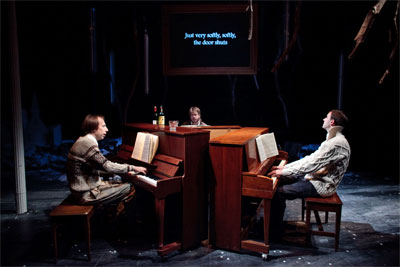
Photo by Ryan Jensen, courtesy of American Repertory Theater
Franz Schubert wrote a tremendous amount of music for his thirty-one years and much of it is wonderful and moving.
Winterreise (Winter Journey) is a song-cycle written in 1827 during the last year of his life. Set to twenty-four poems by Wilhelm Müller, it is a loose account of a walk in the snow by a young man disappointed in love, featuring lyrical snapshots of various things along the way. The mood is achingly and penetratingly melancholic, enlivened by observant curiosity and ironic tonality.
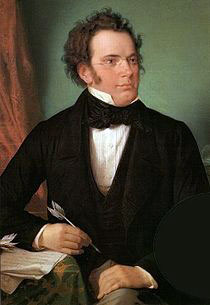
by Wilhelm August Rieder
Some years ago, while giving my dog a long evening walk, a good friend and I happened to touch on the subject of Schubert.
“Hey,” he mused, “seeing those dressed-up portraits, you might figure that he was Herr Schubert to those who knew him. But, isn’t it more likely that this artist in his twenties was hanging out with a bunch that was really just calling him Schub?”
It turns out that this is exactly the issue that Three Pianos addresses. What kind of guy was Schubert? What kind of social context did he have? And if we explore this great, late vocal work of his from that perspective, how does it give us insight into its spirit and meaning?
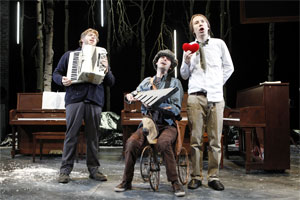
Photo by Ryan Jensen,
courtesy of American Repertory Theater
Apparently, Schubert was ferociously hard at work during his days – how else could he have produced what he did by the age of thirty-one? – but, at night, hung out with friends, sometimes at so-called Schubertiades, drinking and dancing parties, which featured renditions of his new compositions. So, the sense of Schubert as Schub, as an integral part in a group of friends, plays an important role in understanding what is behind the plaintive tones of Winterreise.
And so, three talented male actor-musicians, each with a piano, probe Schubert’s spirit – from both artistic and personal angles – over the course of two hours. It is an intense romp, without intermission, but, in addition to the levity on stage, is lightened by glasses of wine served in one’s seat.
Its structure loosely evolves from Winterreise, and the three actor-pianists putatively go through many of its songs in sequence.
But going through is a very general term that applies to anything from a vague romp in the direction of the music to a beautiful multi-part choral arrangement. And there are lots of improvisational stops in between.
In one of the gags, the three pianos – manageable spinet sized – are put in a circle and one of the players spins from one to the other performing one of the songs in a kind of gymnastic musical collage. It is very entertaining.
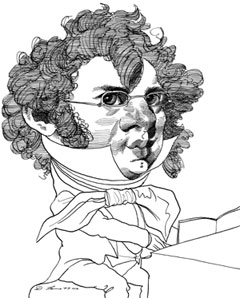
The show is loose, seemingly intentionally so, to give a sense of the usually inebriated and exuberant evenings Schub – or Schwämmerl – spent hanging out with friends. The buoyant wildness of the camaraderie, mixed with the depressive nature of the artistic results, becomes the fused inspiration for what ensues onstage.
So the performance is not, by any means, tightly structured and there is an improvisatory feel to it generally. But, despite the sense, from time to time, that things are not quite taut enough in the writing, or that, in fact, there is not enough of Schubert’s music that actually gets delivered coherently, the show has a good heart and a wonderful intent.
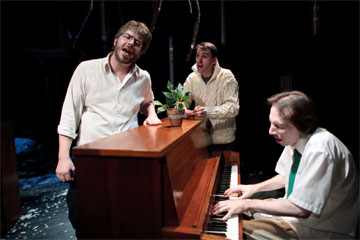
Photo by Ryan Jensen,
courtesy of American Repertory Theater
It might be particularly appealing to those who, feeling some distance from a “long-haired” song-cycle, would want to find a way inside, and learn about how to engage it. That rough and messy process, encouraged by this entertaining and effective performance piece, demonstrates the enormous value of doing so.
This is not theatre in the traditional sense, but it is more in keeping with the kind of performance experimentation that artistic director Diane Paulus has been actively undertaking during her past few seasons at the ART. The various interpretations of Shakespeare – Sleep No More (loosely based on Macbeth), Best of Both Worlds (a rhythm and blues take on A Winter’s Tale), and The Donkey Show (the Midsummer Night’s Dream takeoff, which continues to play at the Oberon Theatre in Harvard Square) – were also performance experiments; but, with their dramatic innovations they created a sensation, and drew in and stimulated new and younger crowds.
It was indeed interesting at Three Pianos to see so many young people, and it was great to see them rise immediately to their feet at the end in appreciation of the spirit of this wild and unkempt, but moving, journey through a Schubert song-cycle.
My friend with whom I took the Schub dog walk was a college philosophy teacher. He said that his aim by the end of the term of an introductory course was not to get his students to know anything but to get them passionately interested.
With regard to classical music, Three Pianos is a wonderful attempt in the same spirit, and which, through its energy and honest curiosity, achieves the same kinds of goals.
– BADMan
Leave a Reply